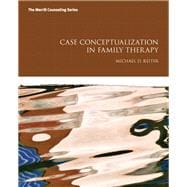In this highly-anticipated new text for courses in family therapy, key concepts and techniques of the most prominent family therapy models are presented and put into practice. Each chapter utilizes the same unique case family to explore the intricacies of how that model views the theory of problem formation as well as the theory of problem resolution. Readers will work their way through nine engaging theory chapters written from the perspective of the founder. As theories are presented, the development of a case conceptualization will take shape and a deeper understanding of the unique situation of one case family currently having difficulties will be explored and studied, and a solution as to what course of treatment might be most appropriate will be evaluated.









